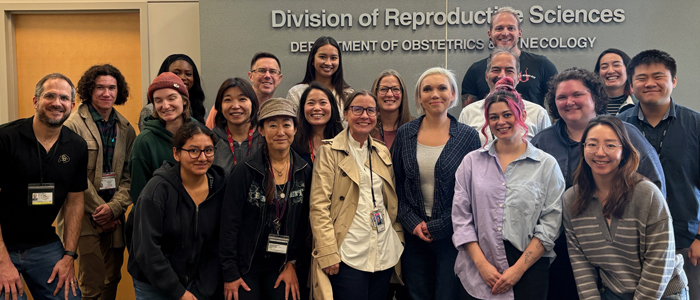CU Anschutz Gynecologic Oncology Research Group
The discovery and optimization of precision medicine-based anti-cancer therapeutics.
Ovarian and endometrial cancers are the deadliest and most common gynecologic malignancies, respectively. Notably, progress has been made in effectively managing these cancers through research and clinical efforts over the past two decades, but there
is still work to be done! Our ultimate research objectives are to aid in discovering and optimizing precision medicine-based anti-cancer therapeutics.
For ovarian cancer, our labs have several significant areas of ongoing research, including early detection and prevention (Dr. Behbakht), disease progression and metastasis (Dr. Bitler/Watson), the tumor immune microenvironment (Dr. Marjon), and novel therapeutic interventions (Drs. Bitler/Behbakht/Brubaker/Corr). Within these research areas, we emphasize the tissue architecture, epigenome, metabolome, and signaling pathways responsible. Further, the lab works closely with the Division of Gynecologic Oncology to ensure the translatability of our discoveries.
For endometrial cancer, we are researching underlying genetic mechanisms of disease recurrence and developing precision medicine approaches to prevent disease recurrence (Drs. Corr/Moroney/Bitler). Based on previous research and clinical findings, we are interested in targeting the Wnt/beta-catenin pathway and immune checkpoint inhibitors.
For ovarian cancer, our labs have several significant areas of ongoing research, including early detection and prevention (Dr. Behbakht), disease progression and metastasis (Dr. Bitler/Watson), the tumor immune microenvironment (Dr. Marjon), and novel therapeutic interventions (Drs. Bitler/Behbakht/Brubaker/Corr). Within these research areas, we emphasize the tissue architecture, epigenome, metabolome, and signaling pathways responsible. Further, the lab works closely with the Division of Gynecologic Oncology to ensure the translatability of our discoveries.
For endometrial cancer, we are researching underlying genetic mechanisms of disease recurrence and developing precision medicine approaches to prevent disease recurrence (Drs. Corr/Moroney/Bitler). Based on previous research and clinical findings, we are interested in targeting the Wnt/beta-catenin pathway and immune checkpoint inhibitors.
Dr. Bradley Corr, MD (Associate Professor)
The National Cancer Center Network (NCCN) recommends all cancer patients be offered clinical trial if available to them. As Director of Clinical Research for the Division of Gynecologic Oncology it is my goal that every patient has a clinical trial treatment option available to discuss with their provider. In addition to opening the best trials across the nation we are also developing trials only available to patients at the University of Colorado. I have developed multiple clinical trials in ovarian and endometrial cancers that are lead here within our division, as well as being the national and international leader of several gynecologic oncology clinical trials. I strive to move the needle forward in advancing therapy options and outcomes for women with gynecologic cancer.
Translational medicine is the bridge between basic science investigation and direct patient care. As a translational scientist, I focus on the Wnt pathways relation to endometrial and ovarian cancer treatment. The Wnt pathway is associated with many cancers but is known to have various effects in both endometrial and ovarian cancer propagation. My focus is on the development on novel therapeutic agents that target this pathway, as well as identification of appropriate biomarkers.
Dr. Lindsay Brubaker, MD (Assistant Professor)
Dr. Lindsay Brubaker has successfully utilized a cutting-edge genetic engineering tool (CRISPR/Cas9) to explore the role of each gene in the process of ovarian cancer dissemination. This is one of the first successful CRISPR/Cas9 screen executed at the University of Colorado | Anschutz Medical Campus by an independent laboratory. The goals are to utilize these findings to develop prognostic biomarkers and to identify novel ovarian cancer vulnerabilities.
Dr. Levi Watson, PhD (Assistant Professor)
High-grade serous carcinoma (HGSC) of the ovary and fallopian tube is the deadliest gynecological malignancy, and it is especially deadly in postmenopausal women, who have an increased risk of developing HGSC and a two-fold increase in peritoneal metastases at diagnosis. Clinicians have observed for decades that HGSC preferentially invades adipose tissues within the abdomen and pelvis. It is known that postmenopausal women often have greater visceral adiposity and chronic peritoneal inflammation, but how these factors promote tumor growth and invasion have been elusive. My lab hypothesizes that a novel adipocyte subtype, bone marrow-derived adipocytes (BMDAs) are a major contributor to HGSC progression.
BMDAs were discovered in 2016 by the lab of Dwight Klemm, PhD, a professor at the University of Colorado Department of Medicine. In collaboration with the Klemm lab, we have shown that BMDAs are a highly inflammatory subtype of adipocytes. Our work shows that BMDAs cause downregulation of tumor suppressor protein expression in ovarian cancer cells while upregulating survival signaling and markers of epithelial to mesenchymal plasticity. Depleting BMDAs in mice diminishes the size of HGSC tumors and reduces the number of peritoneal metastases. Going forward, the goal of my lab is to understand how BMDAs influence ovarian cancer progression and to translate our findings into novel methods of early detection, prevention, and treatment.
Dr. Villagomez, PhD (Post-doctoral Fellow):
Claudin-4 (a cell-cell junction protein) is aberrantly expressed in most ovarian tumors and associated with therapy resistance. This protein has been shown to participate in a DNA repair mechanism and its upregulation in ovarian cancer correlates with reduced indicators of the hallmark of cancer, genomic instability. This hallmark contributes to intratumorally heterogeneity and therapy resistance. Here, we use in-vitro (elimination/over-expression of claudin-4) and in-vivo (PDX-human immune system mice) models of study to describe the physiological contribution of claudin-4 during cell cycle to limit the generation of genomic instability, the impact of autophagy when this hallmark is generated, as well as the activation of the cGAS-STING pathway; a sensor of genomic instability that activates an anti-tumor immune response.
Current Openings in the Gynecologic Oncology Research Group Lab:
Post-Doctoral Fellow, Gynecologic Oncology Research Group
We are searching for a qualified post-doctoral fellow(s) to join our growing laboratory, whose principal investigator is a basic and translational scientist. This individual will conduct research focused on biochemical, cellular, and molecular mechanisms underlying gynecologic cancer progression and therapy resistance. The primary focus of experiments will include, but are not limited to, (1) studies of Golgi organization and mitotic spindle assembly in ovarian cancer, (2) in vitro and in vivo assays of cGAS/STING-dependent antitumor immunity, and (3) studies of tumor-adipocyte interactions and inflammation in the tumor microenvironment. The post-doctoral fellow will be supported through an already funded grant mechanism. Successful applicants will need to demonstrate a strong work ethic, to have the ability to work both independently and collaboratively, to exhibit excellent skills in scientific writing, and to display meticulous, detail-oriented technical skills and record-keeping.









